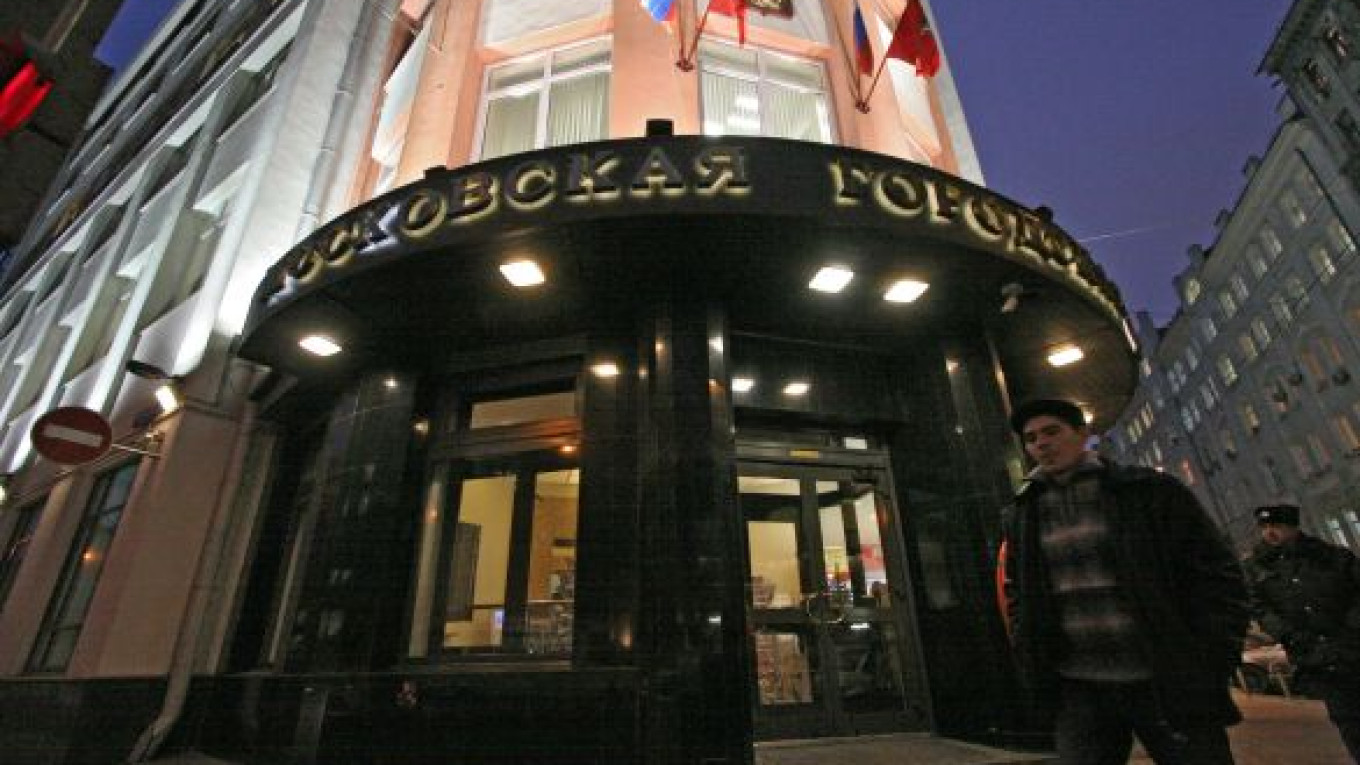The Moscow City Duma on Wednesday tentatively approved two bills put forward by United Russia that would return direct mayoral elections but with restrictions that make it difficult for an opposition candidate to register to run.
The amendments would bring city law in line with a new federal law enacted in May as part of former President Dmitry Medvedev's move to appease the political opposition by seemingly liberalizing Russia's political life.
But city lawmakers chose to include the most stringent restrictions on political candidates that had been allowed in the May law, according to copies of the bills posted on the Duma's website.
As currently drafted, the bills would severely limit the ability of smaller parties to effectively field a candidate, said Andrei Klychkov, head of the City Duma's Communist faction.
"The present amendments do not bring back direct mayoral elections in the way that voters would like to see them," he said.
The bills — introduced as amendments to the and the city's — would require mayoral hopefuls to be nominated by political parties.
The candidates would also need to collect signatures from 10 percent of deputies from all of Moscow's municipal districts or popularly elected district heads in at least three-quarters of the city's municipal districts.
At the same time, the proposed amendments would allow the City Duma to call a popular vote to recall the mayor. Previous laws regulating direct mayoral elections in Moscow — which were abolished in 2004 — allowed only the president to fire the mayor or accept his or her voluntary resignation.
But a recall election would require the support of more than half of Moscow's residents and would not be allowed during a mayor's first year in office.
The bills passed the first reading Wednesday with the key second reading expected to come as soon as June 13.
The May federal law allows regional parliaments to choose whether to allow independents to run for mayor and requires lawmakers to set a limit of 5 percent to 10 percent for the signatures of municipal deputies and district heads that candidates would have to collect.
The job of Moscow mayor is equal in the eyes of the law to a governor's position, and direct elections for the post were abolished under a 2004 law that did away with direct gubernatorial elections.
Opposition political activists and independent analysts told The Moscow Times that the enforced amendments would effectively allow only United Russia and the Communist Party to field mayoral candidates.
Municipal elections in March resulted in 60 percent of Moscow's municipal deputies being either formal members of United Russia or aligned with the party. Another 13 percent are members of the Communist Party, with just 8 percent from A Just Russia. Yabloko and the Liberal Democrats are each represented by 1.5 percent of the deputies. Another 16 percent do not support any of the above parties.
Independent election analyst Alexander Kynev said the amendments were "directed at cutting off the opposition" from participating in elections "to the maximum."
Moscow's city limits are set to expand considerably July 1, with two large administrative districts in the southwest to be joined to the city from the Moscow region. The new territory has been dubbed Greater Moscow.
The number of municipal districts, into which administrative districts are divided, will then grow from 125 to 146, and the number of municipal deputies from to 1,560 to about 1,800.
"There will be gigantic districts where candidates who have no considerable financial backing will not be able to run," Kynev said.
Journalist Yury Zagrebnoi, a former City Duma deputy, said the ability to recall the mayor would "have no practical meaning," as it would be "impossible" to get half of Moscow's massive population of more than 10 million people to back it.
Zagrebnoi said United Russia was "doing itself a disservice" with the proposed amendments because they would likely add fuel to ongoing street protests.
The bill's sponsor, Tatyana Portnova, of United Russia, defended the tight restrictions before the City Duma on Wednesday, saying "people must understand who is behind [a candidate] and what forces support him," NTV state television reported.
The necessity of collecting signatures from municipal deputies "considerably raises the importance of a municipal deputy" because they "effectively will vouch for the mayor with their signatures," she said
Calls to Yabloko leader Sergei Mitrokhin, who headed the liberal opposition in the City Duma until October 2009, went unanswered.
The amendments would also lower the bar for a party to enter the legislature from 7 percent to 5 percent of the total vote and increase the number of deputies from 35 to 45.
United Russia holds 32 seats in the current City Duma, with the remaining three belonging to the Communist Party.
A Message from The Moscow Times:
Dear readers,
We are facing unprecedented challenges. Russia's Prosecutor General's Office has designated The Moscow Times as an "undesirable" organization, criminalizing our work and putting our staff at risk of prosecution. This follows our earlier unjust labeling as a "foreign agent."
These actions are direct attempts to silence independent journalism in Russia. The authorities claim our work "discredits the decisions of the Russian leadership." We see things differently: we strive to provide accurate, unbiased reporting on Russia.
We, the journalists of The Moscow Times, refuse to be silenced. But to continue our work, we need your help.
Your support, no matter how small, makes a world of difference. If you can, please support us monthly starting from just $2. It's quick to set up, and every contribution makes a significant impact.
By supporting The Moscow Times, you're defending open, independent journalism in the face of repression. Thank you for standing with us.
Remind me later.


